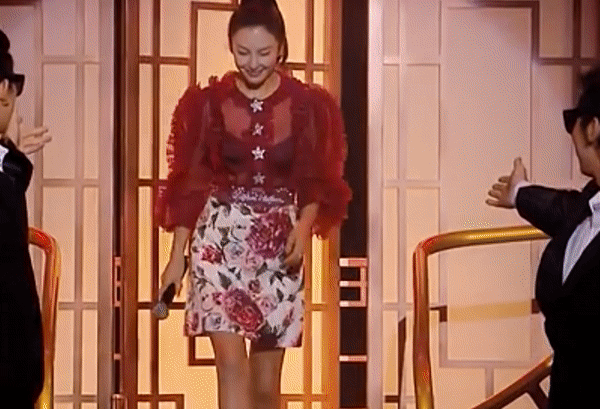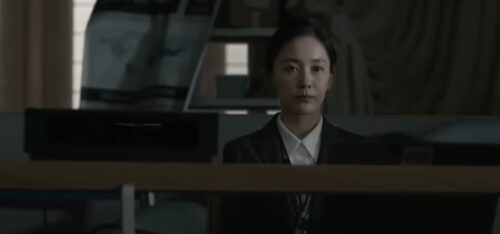Zhang Yuqi and matriarchy: Chinese SNL delivers surprising, strong 2nd episode
Zhang Yuqi and matriarchy: Chinese SNL delivers surprising, strong 2nd episode

Chinese actress Zhang Yuqi 张雨绮 has done sci-fi movies, horror movies, family dramas, and action flicks, but at this point in her career, the most memorable moment of hers was when she appeared on a January episode of the Chinese stand-up comedy show Roast Convention 吐槽大会, in which she confessed that she has “bad taste in men” and had undergone some medical procedures to improve her appearance. That bold statement is a good example of how far she’s willing to go to deliver humor — the self-deprecating variety — to a live audience, and that, I suspect, is partly why she became the first female host of the Chinese version of Saturday Night Live (周六夜现场 zhōu liù yè xiànchǎng), which debuted on June 23 with more than 100 million views on Youku.
On the season’s second episode, Zhang takes over the stage with her impeccable beauty and no-holds-barred outspokenness. She also brings in a quasi-feminist image that she’s been crafting on social media lately, an image of the independent woman who needs no validation from her male counterparts. Despite debates over the authenticity of her newfound cultural identity, the personality certainly offers abundant material for the show’s writers to cook with, which eventually leads to some women-centered skits that are rarely seen on Chinese television.
Zhang Yuqi monologue
Unlike its American predecessor, Chinese SNL lacks a political cold open. Instead, the episode kicks off with Zhang’s monologue, in which she addresses internet trolls who have complained about her excessive appearances on red carpets in international film festivals. “I am an actress. Walking red carpets is part of my job,” says Zhang — while standing on a red carpet. She mentions that she recently won an award for her performance in Legend of the Demon Cat, and jokes that the award gave her access to more red carpets to walk on. Zhang then brings in the resident co-hosts, Chen He 陈赫 and Yue Yunpeng 岳云鹏. The men immediately get teased by the host for their relatively lackluster careers compared to hers. This is not a particularly standout intro, but given that no tricky issues are supposed to be addressed, Zhang’s execution is fairly satisfying.
And then, onto the skits…
Men in a matriarchal society
Somewhere in a primitive tribe, women rule. As the female leader (Mou Zi 牟紫) walks into her cave, her three stay-at-home husbands immediately assemble in a line and bow to their queen, who spends a decent three minutes scolding and physically abusing her “useless men” for a variety of reasons. She blames them for only giving birth to boys, for eating meat that they are not allowed to touch, and for attempting to overthrow the matriarchal structure of society. When the three men report their abusive marriage to a male tribal leader dedicated to protecting men’s rights, they are told to find faults in themselves. “In our society, women are heaven while men are earth. By no means can earth overturn heaven,” the leader asserts (reference?), suggesting that the husbands conform to the norm. By the end of the sketch, Zhang walks in with a torch in hand, affirmatively declaring that the torch of feminism needs to be passed on from generation to generation.
The whole sketch is tight, savvy, and topical. At one point, the male group even make a reference to the recent Didi murder case, saying, “We are bound to be trafficked by the driver if we use the Hitch service, because we are so pretty.” The take on gender inequality here is perfect in that it offers the male audience a glimpse into what modern women face in real life.
The female cocky boss
If you’ve watched enough Korean or Chinese romance dramas, you should be familiar with this basic storyline: a good-looking guy from an affluent family is attracted to an average girl who initially shows no interest in what other people see as an alpha male. But as the guy makes it clear that he is not messing around, the girl falls for him.
This sketch is a parody of this modern Cinderella story. Here, the alpha female played by Zhang is attracted to one of her male interns, who dares to confront her at work and seems unimpressed by her affection. The highlight of the sketch comes when Zhang pulls her crush against the wall in the office, asking the terrified intern to “be her man.” This sketch is, with no doubt, silly, but it will surely put a smile on your face if any of their witty lines rings a bell to you. Also, the twist in the end is sort of spectacular.
Saturday night bus
This segment is equivalent to Weekend Update in the original SNL. He Wenjun 合文俊 and Song Muzi 松木子 spend much of the bit’s first half poking fun at Chinese soccer. They experiment with a new way to do sports commentary, in an attempt to make the Chinese national soccer team sound less terrible. They bring in another cast member to perform a Zinedine Zidane impression, but that clearly doesn’t register well with the live audience because the actor is speaking an alien language.
The second half is dedicated to the massively popular reality show Produce 101. There is a mini sketch in which Zhang plays a contestant in a similar show, who finds out that many of her followers actually don’t like her. They root for her only to seem cool.
Miracle in the delivery room
An expectant mother is having a hard time in a delivery room. After the husband accidentally drops her wife’s favorite foundation on the floor, he discovers that by destroying things that she likes, which are mostly cosmetic products, the woman can push harder. This is, hands down, the worst sketch of the night. It’s unsettling to see the man go on a smashing spree while his pregnant wife is begging him to stop. The man’s violent behavior is encouraged by a doctor and a nurse in the room, which just takes the entire story idea to even more absurd places.
Overall, though, it was a good show, enough to at least get me to watch again. Let’s see how this goes.







